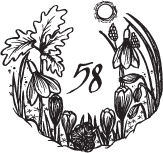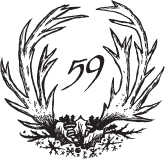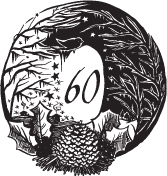Season of Secrets (18 page)
Authors: Sally Nicholls

Â
Â

Â
Â
At school, I'm tired. Miss Shelley is talking about
suspension bridges, but her words are flowing over
my head like water and I can't catch them. The bridge
she's drawn on the whiteboard is stuck to the ground,
so how can it be suspended?
I just blink when Alexander tries to get me to sign
his petition to bring back chips in school dinners.
“It's all right for you lot,” he says. “You get chips at
home. My parents never give me so much as a French
fry! And it's not like chips don't have vitamins. They're
potatoes, aren't they? They're practically our national
food. I'm being denied a valuable cultural experience!”
“We have a national food?” I say and Alexander
shakes his head and goes off after Emily.
When the bell rings for break, Miss Shelley calls
me back.
“You all right, Molly?” she says.
It strikes me as funny that after all that's happened
this year â Mum dying, Dad leaving, my man dying
and then coming back â she picks today to ask if I'm
all right.
“Yes
. . .
” I say. Then, “Miss Shelley, you remember
the wild hunt?”
“Yes.”
“Is it good? Or bad?”
Miss Shelley tucks her hair behind her ear. She
looks at me thoughtfully.
“You know,” she says. “I've never been able to work
that one out.”
“Don't the stories say?”
“Oh, stories,” she says. “I wouldn't trust stories.
They can never agree with themselves from one day to
the next.” She rubs the back of her neck with her
hand. “Spring equinox last night,” she says.
“It was?”
“Oh yes.” She looks at me and then, suddenly, she
laughs. “Don't look so worried, Molly!” she says.
“They won't be back till Beltane. And they didn't hurt
you, did they?”
“They
. . .
You mean they're
real
?”
“I couldn't begin to comment,” says Miss Shelley
seriously. “All questions not relating to long division
or man-made bridging structures should be directed
to the questioner's pagan or religious figure of choice.”
The sun has brought out new freckles on her nose and
for a moment she looks so much like my mum that it
hurts. “Alternatively, you could go and have a look at
the mess the horses made of the lane,” she says.
“Whichever.”
Â
Â

Â
Â
And now summer's here. Blue sky â sometimes â and
sandals and checky school dresses, and sun warm
enough to leave our coats at home. There are daisies on
the lawn and dandelions on the tarmac and cow parsley
and foxgloves growing on the banks by the lane.
Dad gets the job in Newcastle. We're going back to
live with him as soon as he's managed to sell our
house, probably at the end of term, Grandpa says.
He puts in an offer on a funny little terraced house at
the other side of the city, with a long dandelion-y
garden and a sycamore tree with a tyre swing. There's
a school for me at the end of the road and a rough,
tough secondary school with a hockey team and a
youth club and guitar lessons for Hannah.
“About time, too!” says Grandma, but Grandpa
busies himself with the tea things and doesn't say
anything.
“Won't you miss us?” says Hannah, and Grandma
snorts.
“Hopeful, aren't you?” she says. Then she sees the
look on Hannah's face and softens. “Maybe a bit.
We've got used to having you around, messing the
place up.”
“You'll have to come and stay, in half term,” says
Grandpa, and Hannah says we will.
At school, we're allowed back out on to the playing
fields and we have a giant grass fight with all the cut
grass. The little ones build nests in it, for Barbie and
Sylvanian Families and Action Men. Sometimes Emily
and I help them, though we're much too old for baby
games, of course.
When we aren't playing with the littlies, we go off
on our own, Alexander and Emily and I. We climb the
trees at the edge of the field and tell secrets. Emily
tells us how her dad is going to teach her to drive a
tractor, because you don't need a driving licence if
you have your own field, and he'll teach us too when
we go round to her house. Alexander tells us how he
hates playing football, because the other boys always
make him goalkeeper and he always lets the goals in.
“What's it like living with your gran?” says
Alexander, and I screw up my nose.
“It's nice living in the country,” I say. “But I miss
my dad.”
“What's it like not having a mum?” says Emily in
her soft voice. I think about it.
“Lonely,” I say. “Better now Dad's coming back.
But still lonely.”
“You've got us now,” says Emily, but it isn't the
same.
When we're not telling secrets, we're making plans.
We're going to write a book â have a club â build a
treehouse. We get very excited when we think about
the summer, then Emily says, “But Molly won't be
here. She'll be in Newcastle.”
“I'll visit,” I say. But who knows when that will be?
We go back down to Newcastle for the weekend,
twice. The house isn't as clean as I remember it being,
but all the mouldy peppers have gone. Dad takes us
out to the pub to meet his friend, who owns a
newspaper and lets us lose all his money on the fruit
machines. We go ice skating, and we go for a walk in
the park and pick up snails and bits of wood like we
used to with Mum, and we try to remember what
living with each other was like.
“At the end of term,” Dad says, “we'll be home
together again.” And I lie in bed at night in the
lightness of summer evenings, watching the shadows
from my leaf mobile sailing across my wall, and try to
imagine having a home again.
So many things are happening that I don't have
time to think about my man. He seems to have gone
now, anyway. As the summer goes on, he gets further
and further away, like someone I invented or a game I
stopped playing. I went back to his barn once after the
wild hunt, but it was empty. Half of the wall had
fallen in, and no one could live there now.
Â
Â

Â
Â
But I do see him again.
It's my birthday in May. We go to Kielder Forest for
the day. Dad, Grandpa, Grandma, Hannah, Emily,
Alexander and me.
It was never going to be perfect, but it's enough.
The world seems to know that it's my birthday. The
sky is blue from one edge to the other, with fluffy little
clouds like lambs' wool. The forest is full of birds and
green leaves and dappled sunlight. My present from
Auntie Meg is a new grown-up skirt with beads on it
and little mirrors. It's almost exactly the same green as
the trees and it makes me feel like something magical,
something not exactly human.
We spread out our picnic by a stream. Hannah lies in
the grass and reads her magazine, but Emily and
Alexander and I go paddling. We splash Hannah and she
squeals. We splash her again and she runs down to the
stream and splashes us back.
Soon, Hannah's leaving primary school for ever. She'll
be even more grown up than she is now. It's nice to have
her join in with us for once, while we still have her.
After lunch, Grandpa and Grandma settle down
under the trees and the rest of us play tag. Dad's It. He
chases us all around the grass and into the edge of the
forest. We go up as close to him as we dare, teasing him,
and then run away again before he can catch us.
Dad's chasing me, but I run and he gets Emily
instead. Emily gets Hannah and Hannah gets Alexander
and Alexander comes after me.
I'm bubbling up with happiness. It's my birthday and
no one can catch me. I run straight into the forest, then
round again to confuse Alexander. The light is dappled
and mysterious and the air is full of a green, living smell,
of leaves and moss and tree-bark. I can feel the earth
sinking under my sandals and the breeze against my
skirt. Behind me, Alexander has given up and is chasing
Emily, but I carry on running.
Somewhere in front of me is movement. Feet
running, or dancing. Trees rustling. I burst forward into
the clearing, and suddenly I'm part of the dance.
It's like it was in the storm, when the trees held me,
but this time they are dancing. I can feel the joy shivering
through them. I am lifted and spun and passed to other
arms, which lift me and spin me again. Shapes move â
shadowy, laughing dancers, almost human.
I'm placed down on the ground again. I land
awkwardly, and almost fall. Hands reach out and take
mine, strong and warm. I look up, into the eyes that I
know go with the hands.
His hair is thick and brown and curly. His trousers
are a greeny brown, like the trees. A wreath of leaves and
yellow flowers fall over one ear. His face is laughing but
his eyes are the same as they always are, deep and brown
and kind.
He takes my hand and leads me to the centre of the
clearing. He dances me, very slowly and carefully.
Around us the trees bow and sway. The air is full of the
smell of flowers and leaves. Even the sunlight seems to
be dancing.
He bows to me, once, not dropping his eyes, and lets
go of my hand. I know what's going to happen, and I
watch for as long as I can, but he whirls around and is
gone.
I am left there breathless, green leaves in my hair,
sunlight swirling around me, alone.
Behind me in the trees, Emily and Alexander and
Hannah are calling. Mingled with them is Dad's voice,
deep and familiar and full of laughter.
I stand for a long moment there in the clearing, one
arm still out before me.
Then I turn and run back into the game.
Â
Â
Â
Thanks go to Nicola Bowerman, who first gave me the
Oak King myth, and to Christina Oakley Harrington
of Treadwell's Books for reminding me that every story
is told and retold, and showing me some of the places
people have taken this one. Thanks to Tara Button for
all those afternoons writing in coffee shops and to
Tom Harris for being understanding about the need to
take a laptop on holiday and other writing-related
traumas. Also for repeated computer-fixing and general
loveliness.
Â
Many thanks to everyone real and virtual who listened
to me burble and complain, who told their friends
about my books or who read versions of this one in
production. Thanks to my editor, Marion Lloyd, for
saying nice things about the manuscript and then
pointing out all the ways it could be improved.
Thanks to Caro Humphries, Phil Hoggart and Emma
Wiseman for letting me play Cinderella and pay rent
by cooking them lentil moosh. And thank you to
everyone at Scholastic for coming over all Fairy
Godmother-ish, and changing everything.
